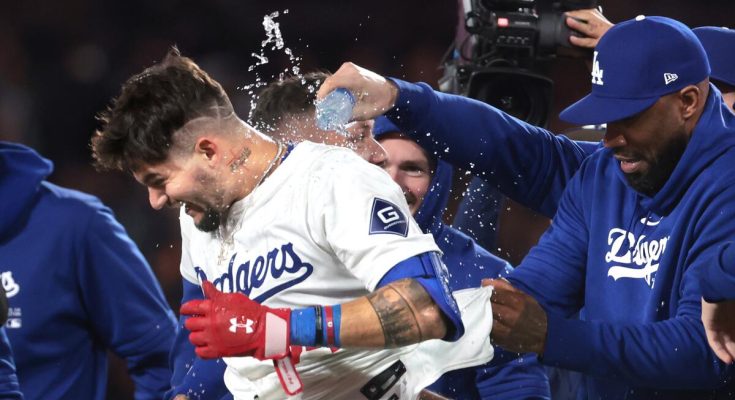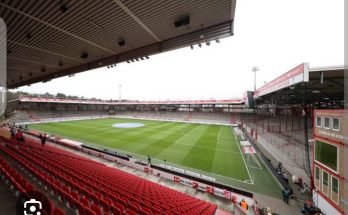The fans at Chavez Ravine came expecting fireworks under the Southern California sky, and they got precisely that—a spine-tingling baseball drama punctuated by a walk-off crescendo that had the entire Dodger Stadium on its feet. In a contest that felt like a playoff preview rather than a midseason showdown, the Los Angeles Dodgers pulled off a stunning 5-4 victory over the visiting Cincinnati Reds, sealing the deal with a walk-off single that sent shockwaves of euphoria through the stadium. It was a game that featured big moments from stars and bench players alike, a test of bullpens, a clash of momentum, and ultimately, a defining Hollywood-style ending.
On a Tuesday night with over 52,000 fans packed into the legendary stadium, the tension was thick from the very first pitch. Dodgers ace Bobby Miller made his return to the mound after a stint on the injured list, while the Reds countered with left-hander Andrew Abbott, a rising arm who has turned heads across the National League. Though neither starter would factor into the decision, both played pivotal roles in setting the game’s tone. Miller looked strong early, touching 99 on the radar gun and mixing in a biting slider that had Reds hitters off balance. However, he ran into trouble in the fourth inning after issuing a leadoff walk to Elly De La Cruz and giving up a two-run homer to Jeimer Candelario, a moonshot to right-center that gave Cincinnati a 2-0 edge.
The Dodgers would answer quickly, as they often do. Mookie Betts, ever the catalyst, led off the bottom of the fourth with a double down the left-field line. Freddie Freeman followed with a sharp single up the middle, scoring Betts and cutting the deficit to 2-1. Will Smith then worked a walk, setting up J.D. Martinez, who grounded into what looked like an inning-ending double play but beat out the back end, allowing Freeman to advance to third. With two outs, Max Muncy delivered a flare to shallow left that dropped in, tying the game and reinvigorating the Dodger faithful. Abbott labored through the frame but managed to limit the damage, exiting after five innings with the game knotted at two.
The bullpens would take over from there, and both sides delivered clutch pitching to keep the game tight through the middle innings. For the Reds, Lucas Sims and Sam Moll provided steady relief, mixing in sliders and cutters to disrupt the Dodgers’ timing. On the Dodgers’ side, Joe Kelly, Ryan Brasier, and Brusdar Graterol formed a dominant bridge, each working a clean inning with velocity and precision. Yet, as is often the case between two playoff-caliber clubs, the margin for error shrank by the inning.
It was in the eighth when the pendulum swung violently. With two outs and a runner on first, the Reds turned to pinch-hitter Jake Fraley, who laced a double into the right-field corner, moving Jonathan India to third. The Dodgers called upon Evan Phillips, their reliable closer, for a five-out save attempt. But on Phillips’ second pitch to Spencer Steer, a wild pitch skipped past Will Smith, allowing India to score. On the very next pitch, Steer rifled a single to left, scoring Fraley and pushing the Reds up 4-2, silencing the crowd.
But the Dodgers have never been a team to lay down quietly, especially not in front of their home crowd. The bottom of the eighth began with a single by Chris Taylor, followed by a sharp double by Kiké Hernández down the third base line. With runners on second and third and nobody out, the Reds turned to closer Alexis Díaz early. He struck out Miguel Rojas on three pitches but surrendered a sacrifice fly to Betts that made it 4-3. Freeman, ever calm in the chaos, then delivered the moment that turned the game. On a 1-2 pitch, he looped a single into center field, scoring Hernández and tying the game again. The crowd erupted. The Dodger dugout spilled over the railing. It was a moment of resurrection after the earlier gut punch.
As the game reached the top of the ninth, Phillips returned and worked around a walk with a strikeout and a pair of flyouts, preserving the tie and giving the Dodgers a chance to win it in the bottom frame. What happened next was quintessentially Los Angeles—an unpredictable, cinematic, heart-racing sequence that could have been ripped from a screenwriter’s notebook.
It began with a leadoff walk to J.D. Martinez. Muncy followed with a long at-bat that ended in a fielder’s choice, Martinez erased at second but Muncy reaching safely. Taylor then worked a walk of his own, putting two runners on with one out. The stage was set for Hernández, who had already doubled earlier and was swinging a hot bat. But Díaz, bending but not breaking, blew a 98-mph fastball by him for the second out, leaving the game in the hands of James Outman, recently recalled from Triple-A and looking to reestablish himself.
Outman took a first-pitch strike, then fouled off two tough pitches. Down 0-2, he shortened his swing and fought off a slider. The next pitch was a high fastball, and Outman didn’t miss. He sent a liner into right-center that fell in front of the diving T.J. Friedl. Muncy came roaring around third and scored easily, with Taylor sliding into third on the play. The stadium shook. Fireworks burst. Outman’s teammates mobbed him near first base as the scoreboard flashed “WALK-OFF WINNER.”
It was the Dodgers’ fifth walk-off victory of the season and one that carried an emotional weight. The comeback from two separate deficits, the clutch contributions from bench players, the resilience of a bullpen worn thin by a long homestand—it all combined into one of the season’s most electric moments. For Outman, who had been demoted earlier in the year after struggling at the plate, the moment was redemptive. In a postgame interview, he called it “the best feeling I’ve had in a long time,” crediting the support of his teammates and hitting coaches for helping him stay ready.
Manager Dave Roberts was effusive in praise, both for Outman and the team’s tenacity. “That’s a playoff-type game right there,” Roberts said. “The Reds are a good team. They gave us everything we could handle, but our guys battled every single pitch. James came through in a huge way. We’re proud of him, and we’re proud of the fight in this clubhouse.”
For Cincinnati, it was a bitter loss in a game they twice had under control. Díaz, their All-Star closer, took the loss despite throwing 35 high-stress pitches and nearly escaping trouble. Manager David Bell was diplomatic but clearly frustrated postgame, noting that “these are the kinds of games that test your mettle. We’ve got to finish. We’ll learn from it.” Still, the Reds remain squarely in the hunt in the NL Central and showed plenty of fight themselves, particularly in their eighth-inning rally.
The Dodgers, meanwhile, continue to roll through the summer heat with the poise of a team that’s built for October. Freeman’s three hits raised his average to .318, while Betts’ energy and Taylor’s patience loomed large in the late innings. The return of Miller, even in a no-decision, gives the rotation another boost, and the bullpen’s resilience will only grow in value as the season stretches into the dog days.
There was something about this win that felt more than ordinary. Maybe it was the drama. Maybe it was the opponent. Or maybe it was just the way the night unfolded—back-and-forth, full of tension, climaxing in a feel-good story for a player like Outman. Whatever it was, it had all the makings of a summer classic, a highlight reel moment in a long season, and a reminder that in baseball, no matter how many stars you have, it’s often the unlikely hero who writes the final chapter.
The Dodgers left the field to thunderous cheers, the players tossing caps and gloves in celebration, the fans lingering in the aisles to soak it all in. And as the Los Angeles skyline glowed just beyond the outfield walls, one couldn’t help but feel that this was exactly what Dodger baseball is all about—big moments, bold comebacks, and walk-offs under the lights in the city of stars.



